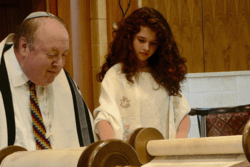What I Would Have Said
This past summer I went to Israel for three weeks on a teen trip with my summer camp: a rite of passage for Jewish teens. It was my second time visiting Israel; I had previously been with my family. Of everyone in the group, I was arguably the most observant Jew, but everyone, regardless of religious practice, had a connection to Judaism and to Israel.
When we were staying with Israeli teens in Karmiel, we went rafting and swimming in the Jordan river. Nearly all the girls in the group wore bikinis. When I put my bikini on that morning I didn’t even think about it; I just took out the first one I could find in my messy suitcase. When we were waiting to get in the rafts, a group of ultra-orthodox women wearing long skirts and long-sleeved shirts came up to us. One of them began talking to me. She asked me in English where I was from and I told her I’m from Pittsburgh. When she started talking to me, I had no idea what her intentions were.
I heard her strong Jersey accent and thought she might be wondering what type of trip we were on; we got that question a lot. She then asked if I dressed like this when I’m in Pittsburgh, and I knew what she was about to say. I said yes because I didn’t want to argue with her. She then told me I was an animal walking around naked. She also said that I’m not a Jew because I choose to present myself in this way. At the time, I just stood up and walked away. I decided that nothing I could say would change her opinions. If I could go back though, I would say this: There is nothing in the Torah that says that I can’t wear a bathing suit.
The Torah states that linen and wool can’t be mixed together. The only mention of modest dress has to do with dress while praying. The Torah does say that women and men shouldn’t wear clothes for the opposite gender, but it doesn’t say what clothes are for what gender. The idea that pants are for men and skirts are for women is a social construct. Ultra-orthodox garb is more influenced by social and historical context rather than by religious text; it is custom.
"On three things the world stands: on the Torah, on the service and on acts of lovingkindness." This is a teaching from Pirkei Avot. From a very young age, my Jewish identity was rooted in these three pillars of Judaism. This idea is based in Jewish text, so I had always felt confident that I was leading a Jewish life based on Jewish law and teachings. This moment in Kfar Blum was a harsh reminder that despite the core text that all Jews share, traditions still vary widely.
I don’t want to send a message that my way of being Jewish is better than that of the ultra-orthodox. Although I don’t necessarily agree with many of those practices, I realize that their traditions are important to them, just like mine are to me. What I do want to say is that my beliefs and practices are equally as authentic as theirs, and I do sometimes struggle to respect someone else’s opinions when I feel that they’re hurting other people. I don’t have a problem with Jewish women choosing to dress modestly, but I do have a problem when someone feels they have a right to criticize my choices.
When this woman challenged my Jewishness, she challenged my identity. I believe that one of the great things about Judaism is that it’s adaptable, and that we can follow the Torah’s commandments while still living in the modern world. While this woman’s comments were unkind to say the least, her words have stuck with me, and have sparked much self-reflection about who I am as a Jewish woman.
This piece was written as part of JWA’s Rising Voices Fellowship.








Amen v'amen! I'm going to post the URL of your blog to my (Reconstructionist) synagogue's mailing list.
Very well said. I think in light of #metoo , posting this is very timely. I think you have the essentials of our tradition exactly correct. Proud to know you!